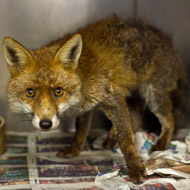Campaign to raise awareness of wildlife crime

The public will be asked to familiarise themselves with the signs of wildlife crime and report any evidence to Crimestoppers anonymously
World Animal Protection have joined forces with Crimestoppers to raise public awareness of wildlife crime and who it should be reported to.
Throughout this week (18-25 October), the organisations are working together to raise public awareness of poaching, badger baiting, hare coursing and other crimes against wildlife.
Twenty police forces from around the country are also promoting the week within their own constabulary areas, letting residents know what they are doing to crack down on wildlife crime locally.
Alyx Elliot from World Animal Protection said: “We know the public adore the wonderful British species like badgers, bats, hares and birds of prey, but they may not be aware of the devastating crime that affects them.
"This week will empower people to recognise the signs of certain crimes like badger set disturbance, raptor poisoning, hare coursing, or poaching so they can report it to the police, or Crimestoppers and help protect our beloved wildlife.”
Poaching and hare coursing are common problems in many UK counties and criminals can make as much as £12,000 from the sale of a single carp. However, many members of the public are not away of the wildlife crimes happening around them or how they can report it to the authorities.
The problem affects towns and cities just as much as the countryside. Recent successful prosecutions by the Metropolitan Police have included cases against a jeweller selling tiger claw necklaces, a contractor for destroying the habitat of roosting bats, and a man in Croydon for killing a deer in his own home.
Wildlife Crime Awareness Week is backed by a host of celebrities including Stephen Fry, Michaela Strachan and Deborah Meaden, who will be encouraging the public to familiarise themselves with the signs of wildlife crime and report any evidence to Crimestoppers anonymously, or to the Police on 999.
Deborah Meaden said: “I am supporting Wildlife Crime Awareness Week as I want to urge the British public to consciously watch out for signs of crime such as poaching, baiting and trapping across the country, and if you see something suspicious – report it. No matter whether you live in a city or the countryside, get involved and use this week to find out what you can do to help tackle wildlife crime.”
Ann Scott, Crimestoppers campaigns manager, added: "You may think that your information is insignificant, but it could be that last bit of the jigsaw which police need to uncover a serious crime. Help us stop wildlife crime. Help World Animal Protection protect our wildlife.”
If there is a wildlife crime in progress call 999 or for a non-emergency call 101. If you want to give information regarding a crime anonymously, call Crimestoppers on 0800 555 11.



 The BSAVA has opened submissions for the BSAVA Clinical Research Abstracts 2026.
The BSAVA has opened submissions for the BSAVA Clinical Research Abstracts 2026.